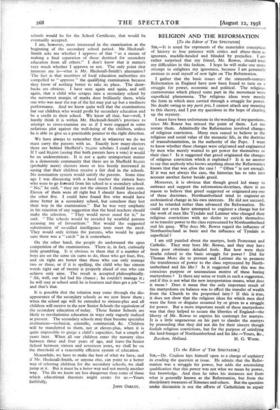RELIGION AND THE REFORMATION [To the Editor of THE SPECTATOR]
Sta,—It is usual for exponents of the materialist conception of history to lose patience with critics and abuse them as ignorant, muddle-headed and blinded by prejudice. I am rather surprised that my friend, Mr. Rowse, should treat my difficulties in this fashion. I hope he will make one more attempt to enlighten my ignorance, because I am genuinely anxious to avail myself of new light on The Reformation.
I gather that the basic issues of the sixteenth-century Reformation in England have now been found to turn on a struggle for power, economic and political. The religious controversies which played some part in the movement were superficial phenomena. The religious ideas were merely the form in which men carried through a struggle for power. No doubt owing to my parti pris, I cannot attach any meaning to this theory, and I put my questions in the hope of clearing up the mystery.
I must have been unfortunate in the wording of my questions, since Mr. Rowse has missed the point of them. Let me restate them. Admittedly the Reformation involved changes of religious conviction. Many men ceased to believe in the religious and social value of the monastic life, in the doctrine of transubstantiation, in the authority of the Pope. I want to know whether these changes were originated and engineered . by men who merely wanted to get power for themselves or their class ? Is it suggested that greed originated the changes of religious conviction which it exploited ? It is no answer to say that anybody who knows anything about the Reformation knows that that was often the ease! " Often " is not enough. If it was not always the case, the historian has to take into account another factor beside greed.
Moreover, it is obvious that though greed led many to embrace and support the reformation-doctrines, there is no reason to believe that greed suggested or originated any one of these doctrines. Northumberland tried to engineer an ecclesiastical change in his own interests. He did not succeed, and he retarded rather than advanced the Reformation. He could not even have attempted to engineer a change but for the work of men like Tyndale and Latimer who changed their religious convictions with no desire to enrich themselves or to transfer power to the class represented by Northumberland and his gang. Why does Mr. Rowse regard the influence of Northumberland as basic and the, influence of Tyndale as superficial ?
I am still puzzled about the martyrs, both Protestant and Catholic. They may bore Mr. Rowse, and they may have been poor obstinate deluded fools. But how were their deaths related to the basic struggle for power ? Did Sir Thomas More die to prevent and Latimer die to promote the transference of power to the class represented by North- umberland and his like ? Is it suggested that this was the conscious purpose or unconscious motive of these boring martyrdoms ? Is there any sense or truth in such a suggestion, and if this is not what the new interpretation means, what does it mean ? Does it mean that the only important result of the martyrdoms on balance was to effect the transfer of wealth from the Church to the propertied laity ? If this is true, it does not show that the religious ideas for which men died were the form or disguise assumed by or given to a struggle for power. But a more important result of these martyrdoms was that they helped to secure the liberties of England—the liberty of Mr. Rowse to express his contempt for martyrs. It is a little ungenerous on his part to slander the martyrs by pretending that they did not die for their sincere though foolish religious convictions, but for the purpose of satisfying the land-hunger of Northumberland and his like.—Yours, &c.,






































 Previous page
Previous page